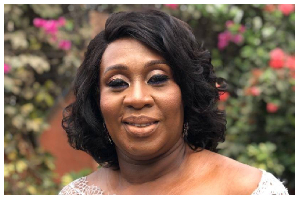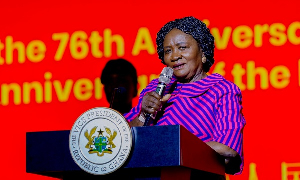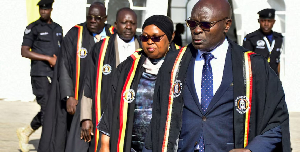Do not be surprised if for the next two years your usual ‘trotro’ car does not play your favourite Agyako movies or Cecilia Marfo’s songs to help calm your nerves after work back home. This is because Hope for Future Generations (HFFG), a locally based NGO, whose focus is to give equal opportunities to woman and children, is embarking on a two-year effective media advocacy campaign to help bring about behavioural change towards the use of long lasting insecticide nets in eradicating malaria in Ghana.
Malaria, which is said to be the mostly reported OPD cases currently in the country, is killing more people than HIV/AIDS.
Even though, everybody – young or old, rich or poor – is at risk, the most vulnerable people at the mercy of malaria are believed to be children less than five years old, pregnant women, and immuno-compromised patients.
Kwame Dzudzorli Gakpey, a representative from National Malaria Control Programme, said at a media interaction organised by HFFG in Accra that the dangerous malaria directly affects six out of eight Millennium Development Goals. The rest two are indirectly affected.
Mr Gakpey debunked the misinformation that all mosquitoes cause malaria. He explained that malaria is a sickness caused by parasite plasmodium and transmitted by female anopheles mosquitoes.
He further explained that anopheles do not breed in dirty areas. “Other mosquitoes do, but they give yellow fever and other diseases like lymphatic diseases.”
Some breeding grounds for female anopheles mosquitoes are rice farms, road constructions areas, flower pots, ponds, pot holes, dugout pits, hoof prints, paddles, and in any other stagnant waters.
Types of Malaria
There are two types of malaria diseases. One is simple or uncomplicated form and the other is the severe or complicated form.
The simple forms are fever, headache, muscle pains, joint weaknesses, chills and rigors; abdominal pains, vomiting, loss of appetites; and difficulty in breathing.
The complicated or severe forms can affect every part of the body. These may include severe anaemia or pale eyes, palm, and lips. The rest are blood urine (dark-coloured urine); jaundice; very high temperature; spontaneous bleeding from gums; generalised extreme weakness; convulsion, and consciousness.
Defeating Malaria
For Ghana to be declared a malaria free country, all and sundry is needed to eradicate the epidemic in the country. While stakeholders are to provide financial and educational supports, the citizens on the other hand are expected to give their unflinching support using long lasting insecticide nets and encouraging their friends and family to also do so. Mining and manufacturing companies are called upon to be circumspect in their activities.
Expected Behavioural Change
It is the hope of HFFG that at the end of her two-year campaign, health service providers should first diagnose before treating malaria cases.
Citizens should sleep in long lasting insecticide nets to protect themselves from female anopheles mosquito bites and do away with the disheartening attitude of using treated nets as fishing nets or seedling shades.
That citizens will find treated nets as comfortable in-house shades, which do not cause heats or serve as a pseudo coffins.
The eradication of malaria is highly possible. Let us invest in it and eradicate it for the betterment of all of us. Long live Ghana, long live the human resource!
The writer is Bright Selasie Yao Avornyo, the Public Relations Officer of Immanuel Academy (WASSCE) Remedial School at Osu. His email is allknowing00@yahoo.com
Opinions of Thursday, 3 March 2016
Columnist: Avornyo, Bright Selasie Yao














